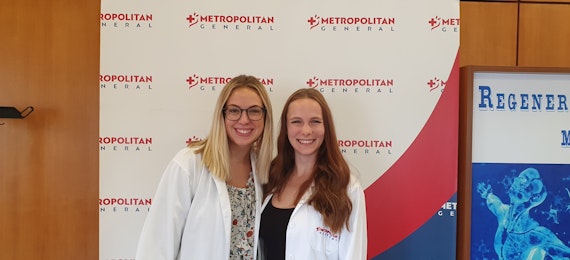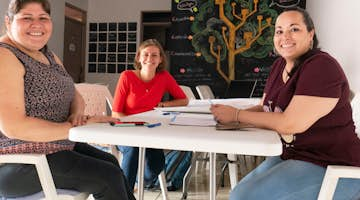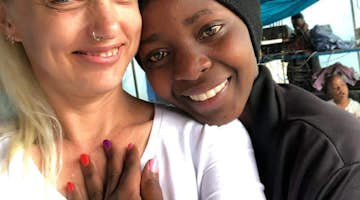
Public Health Internships in Cape Town
Gain practical experience in the vast field of public health, helping multidisciplinary professionals to educate, prevent and support communities across Cape Town. On these Public Health internships, you’ll assist qualified healthcare professionals with projects that are ultimately intended to protect and improve the health of people and their communities. There is a broad range of placements available within this field, which may have different areas of focus and diverse perspectives. Come prepared for a culturally immersive experience which will expand your outlook on how careers in public health can come to life.
What to expect from your Public Health internship:
- Gain an understanding of how public health systems can work for progressing community well-being.
- Learn about different challenges that public health entities work to address or solve.
- Collaborate with professionals on projects and campaigns intended to promote healthy lifestyles, through the prevention of harm.
- Enjoy spare time exploring the unique and eclectic city of Cape Town, and wider South Africa.
Your internship abroad host organization:
- Non-medical roles in clinics and hospitals
- NGOs
- Research Institutions
- Environmental Health Organizations
- Community Health Centers
Internship details
Gain practical experience in the vast field of public health, helping to educate, prevent and treat local communities across Cape Town. On these Public Health internships, you’ll assist qualified healthcare professionals on rich educational placements including diverse health projects and community medical clinics.
This is an in-country internship, with accommodation provided. Click here to check out remote internships, which you can undertake from home.
South Africa’s healthcare system faces many serious challenges. These can be related to modern lifestyle behaviors, which negatively affect health, but challenges can also be linked to poverty and disparity within populations. Public health is a hugely important field that provides a range of prevention and intervention techniques for common issues among communities. Whether working to address obesity, smoking, drug abuse, addiction, domestic violence, malnutrition, disease, and more, there is no shortage of professional institutions working to support communities with better outcomes for wellness.
Public Health internships are considered to be non-medical. Supervision is unlikely to be provided by medical professionals, such as doctors. Internship placements may be provided through clinics or hospitals, but the internship role itself is non-medical. Otherwise, other placement opportunities can be offered by relevant NGOs, Research Institutions, Environmental Health Organizations, and Community Health Centers. Interns wanting to focus their placement in a specific field should include details in their application. Placement preferences are considered but always subject to availability. Interns should expect to be flexible with their schedule, as placements may have flexible hours.
In all cases, interns should expect that the first week of their experience will focus on settling in and gaining some introductory knowledge, as you will not “hit the ground running”. Rather, you should start with learning about the placement to gain an understanding of what you can build upon, develop, learn, and contribute. Ensure that you ask questions and provide feedback during the introductory period so that your supervisor understands how you’re progressing. This will help them to better understand important details, such as how quickly you learn, what you find challenging, what you find interesting, etc.
Understand and expect that individual internship experiences vary, as the specific placement that you’re assigned will depend on a review of your resume and your current level of studies and experience. Therefore, if you’re at a more introductory level, you should reasonably expect a more introductory internship. Likewise, if you’re interning for a shorter duration, you will have a different experience from someone who is interning for a longer duration.
What are the career benefits of interning abroad as a Public Health Intern?
Public Health interns learn from a qualified and experienced supervisor, and can be involved in:
-
Assisting in delivering public health programs and campaigns.
-
Supporting educational public health classes in the community.
-
Contributing resources related to public health promotions and community education.
-
Assisting with administrative, funding, public relationships, and events activities.
Professional development opportunities:
-
Experience South Africa’s public health system in action.
-
Gain an understanding of preventive public health measures.
-
Build your understanding of complex challenges and diverse cultural perspectives within public health sectors.
-
Build essential communication skills for the delivery of public health initiatives.
-
Gain practical skills and boost your employability, with guidance from RISEWAY’s Experiential Learning Curriculum to support your learning and cultural intelligence.
Are you eligible for this internship?
Submit a free application so we can confirm your eligibility and check availability for your preferred dates.
Not sure which program to join?
South Africa photo gallery
What recent Public Health interns said about their experience
My two month public health internship in Cape Town, South Africa was unique, adventurous, and unforgettable. I made a significant impact in the health field at my internship location during the day and experience the beauty of South Africa during the rest of the day/weekends. My accommodations were a one minute walk from town, which allowed me to maximize everyday enjoyment in the city. It was convenient living near the grocery store, coffee shops, the local bar/pub, clothing stores, and restaurants. I followed all safety procedures and did not experience unfortunate events. The assurance of safety allowed me to enjoy activities in the city, such as hiking table mountain, shopping at the water front, watch the sunset with friends, wine tasting, swimming at camps bay, and dancing on Long Street. I also met a lot of other international students and local students that accompanied me during my activities. My new friends made every event unforgettable and left unique memories. I also went on adventures that I have never done at my home country such as shark diving, go on a safari, pet a cheetah, bungee jumping off the world’s tallest bungee jump bridge, tandem paragliding, and kayaking. It’s amazing how much I was able to accomplish while working an 8-4 job. This was truly an experience of a life time.
To read all reviews, visit our reviews page.

Academic credit available for all internships
Get course credit from your college or university while completing your internship abroad or a remote internship program. It's a great way to meet your academic requirements and gain valuable experience at the same time.
Learn about course creditProgram fees
Applying for our Public Health Internship is completely free! The support package covers the assistance we provide in finding your internship and arranging your living accommodations in your host country, ensuring you thrive during your program.
Please note that a deposit of US$499 is required to confirm your place. The remaining balance (minus your initial US$499 deposit) is due at least 60 days before your internship start date.
Duration |
Program Fee (USD) |
|---|---|
| 8 weeks | $3,057 Equivalent to $54 /day |
| 10 weeks | $3,760 Equivalent to $53 /day |
| 12 weeks | $4,131 Equivalent to $49 /day |
| 16 weeks | $4,982 Equivalent to $44 /day |
| 20 weeks | $5,723 Equivalent to $40 /day |
| 24 weeks | $6,465 Equivalent to $38 /day |
- Airport pick-up
- Accommodation
- 24/7 in-country support
- Program orientation
- Dedicated support before, during, and after your internship
- In-country guidance for social and tourist activities
- Sourcing and securing your internship placement
- Personalization of your internship plan
- Coaching from your supervisor
- Documented portfolio of your experiential learnings
- Academic credit facilitation
- International reference letter
- Certificate of Internship Completion
- All meals
- All in-country transportation
- Visa (if required), flights, travel insurance (mandatory), vaccinations, criminal background check
- Transfer back to the airport at the end of your internship program
- Personal spending money for snacks, drinks, public transport, laundry, and leisure activities during your free time.
- A deposit of $499 (approximately 499) is required to secure your internship
- Balance of your Program Fee is due 70 days before your internship start date. The Program Fee payment can also be completed in installments through our Zero-Fee Payment Plan. Learn more.
- All payments attract a 5% transaction fee to cover international banking fees and currency charges.
- Terms and Conditions apply.
Free-time experiences & tours in Cape Town
Take your internship to the next level with RISEWAY's affordable activity and tour add-ons in Cape Town! Explore your options below and learn how to book them once you've been accepted onto an internship program.

Stand at the southernmost tip of the African continent and experience Chapman’s Peak, cute African Penguins at Boulders Beach and Muizenberg’s golden shores with our Cape Point Tour.

Embark on the Garden Route Tour for an adventure of emerald forests, turquoise coastlines and a rich tapestry of wildlife and culture.

Embark on an unforgettable journey with our Safari & Wine Tasting Adventure in South Africa! Experience wildlife encounters and wine tastings against stunning landscapes.
Arrival and Orientation
Internships in Cape Town begin every Monday and interns may choose to spend a minimum of 4 weeks, up to a maximum of 24 weeks. (Exceptions to start date availability may occur when start dates are closed due to public holiday disruptions or if the program has already reached capacity). Fewer internship positions are available during late December and early January, due to the Christmas and New Year holiday period.
Airport pick up and accommodation are included in the Program Fee. The accommodation is covered from the Saturday night before the Monday start date. Interns are asked to arrive on the Saturday before their Monday start date, to allow sufficient time over the weekend to rest and become oriented before beginning on the Monday. The last night of accommodation that is covered by the Program Fee is the Friday night of the final week, leaving interns to depart on the Saturday morning. Extra nights of accommodation can be pre-arranged upon request and paid for separately.
All participants fly into the Cape Town International Airport (CPT), in order to receive their airport pick up and be transported to the accommodation by a pre-arranged driver. Upon arrival to the accommodation, interns are met by a local team member, who will greet them and assist with settling in. Note that all participants are advised not to book flights until they have first registered to confirm their internship placement.
Orientation typically takes place on the Sunday before the Monday start date. It covers important details for the internship, including introductions, information about culture, customs, rules, expectations, safety, language lessons, cultural excursions, and more. Interns join their placement on the following day.
If you are planning to spend time in Cape Town prior to your internship and will not require an airport pick up, we can arrange an alternative pick up from another location within the central city.
Check what's required to visit South Africa
Check out the widget below to learn about the visa requirements for the Public Health internship in South Africa, based on your country of residence.
Accommodation and WiFi
Internship placements are spread throughout Cape Town’s main city center and surrounding suburbs. Accommodation arrangements will be confirmed, once your internship placement has also been assigned. In most cases, accommodation will be situated in the suburbs of Observatory and Mowbray, enjoyed for proximity to the CBD and other attractions. Alternatively, accommodations may also be situated within the Newlands district.
Interns are accommodated within shared lodging, making it easy to connect with fellow program participants. Interns can expect to share a room with another intern (of the same gender). Bathrooms are also shared with a hot water shower and western toilets. WiFi is available and is also accessible at nearby cafes and restaurants. All accommodation provides cooking facilities.
It is important to note that an accommodation bond is requested at check-in. The cost of the bond is US$200, so you must budget for this. This bond is refundable, less a US$30 cleaning fee, upon your departure, provided that an inspection has been completed to confirm that you have not caused damage to the property or a need for extensive deep cleaning.
Transportation is not provided for in-country commutes between the accommodation and internship placements, so all interns must budget for this independently. The maximum travel time is typically no more than 60 minutes each way (depending on traffic congestion in the city). In all cases, internship placements will be assigned in consideration of commute logistics and opportunities to ride-share with other interns, where possible.
For convenience and safety, local coordinators can arrange a dedicated shuttle service for ongoing placement commutes (Monday through Friday). The cost for this service ranges from approx. US$150 - US$250 a month, per person, depending on the location of your placement. (On a daily basis, this could be equated to approx. US$6-12 per day). If you want to organize this service, please communicate with coordinators when your placement details are being arranged in advance.
Alternatively, for the use of Uber, it is possible to spend US$10-US$20 per day on rides, depending on where you’re going. Please budget for this, especially if you intend to use this transportation method a lot during weekends and free time.
Please note that the accommodation pictured in the photo gallery of this webpage is provided as an example. Since - depending on capacity - we can work with more than one accommodation address, the exact accommodation location or room that you’re assigned may differ from the photos. Rooms sizes, along with storage space, varies. However, you may expect similar arrangements to those that are demonstrated here. If you have particular requests/questions in advance, please communicate with us in advance.
Meals
It is important to note that internships in Cape Town do not include meals. The accommodation is located within short walking distance to an affordable supermarket, as well as great cafes and restaurants. All accommodation also provides cooking facilities.
You can readily drink the tap water throughout the city. However, it is advised to bring your own water supply when traveling to and interning in the townships.
You should aim to budget approximately US$100 per week for food. If you like to go out frequently (rather than going to the grocery store to prepare some of your own meals) then you need to budget up to US$150 per week, at least (this budget can vary depending on personal spending habits). Note that, when you go to a restaurants, there is a cultural expectation to tip at least 10%.
Essential country information
| Capital | Pretoria (Executive), Bloemfontein (Judicial), Cape Town (Legislative) |
| Population | 55.91 million |
| Languages | Afrikaans, English, Zulu, Xhosa, Swati, Tswana |
| Currency | South African Rand (ZAR) |
| Time zone | UTC+02:00 |
Weather and climate:
South Africa is generally temperate, however due to varied topography and oceanic influence, a great variety of climatic zones exist. This ranges from the extreme desert of the Namib (northwest South Africa), to the subtropical climate along the Mozambique border and the Indian Ocean (eastern South Africa). Winters in South Africa occur between June and August.
In Cape Town, the summers are warm, dry, and mostly clear; the winters are long, cool, wet, and partly cloudy. It is windy year round and common to see windsurfers enjoying the surf. Over the course of the year, the temperature in Cape Town typically varies from 48°F (9°C) to 76°F (24°C). The warm season in Cape Town usually ranges from December through March and the coldest months are June through September.



























































































